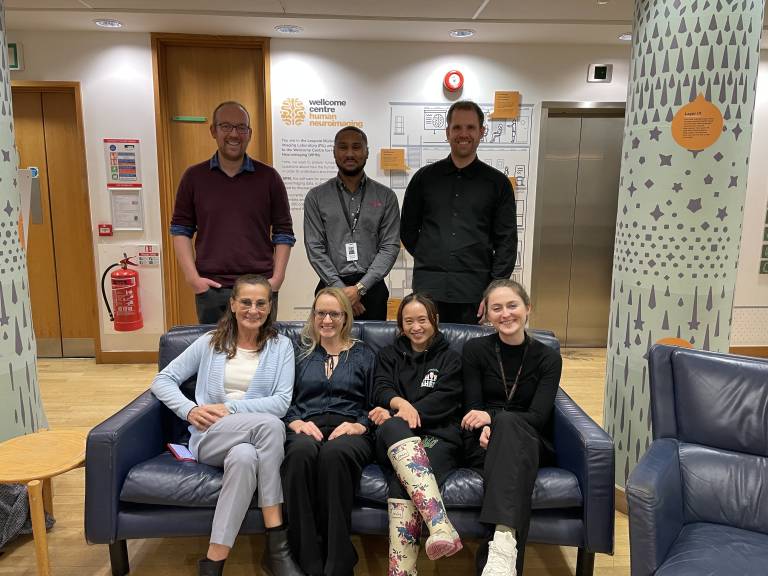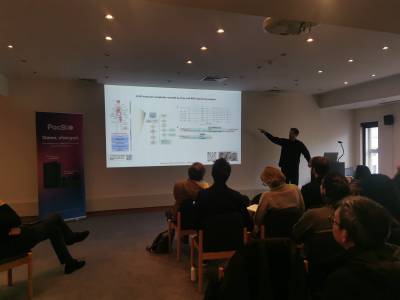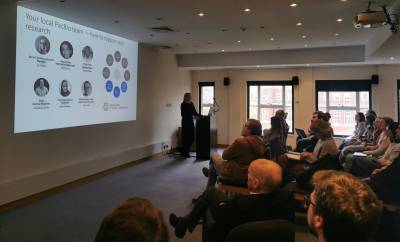First UCL-PacBio RNA Symposium 2023
28 November 2023
The UCL Queen Square Institute of Neurology in collaboration with Pacific Biosciences (PacBio), hosted the first UCL-PacBio RNA Symposium on 21st November 2023.

This event brought together researchers and experts to discuss the latest developments in long read transcriptomics, with a focus on neurodegenerative diseases.
Transcriptomics is like taking a detailed inventory of all the messages being sent out in a cell at any given time. In our cells, genes are like blueprints, and transcriptomics studies the messages (called RNA transcripts) that are copied from these blueprints. This helps us understand what a cell is doing, or planning to do, at any moment. In order to read these RNA molecules, most technologies require us to fragment them into smaller pieces, which means that at the final stages we don’t have information for the whole molecule.
The symposium began with PhD student Hannah Macpherson introducing UCL Long Read Sequencing Facility, a collaborative effort established in 2019 between the Department of Neuromuscular Diseases, UCL Queen Square Institute of Neurology and UK Dementia Research Institute, led by Professors John Hardy and Henry Houlden. She provided an overview of the facility’s technologies and their applications in current research.
Hannah Macpherson said “The Long Read Sequencing Service has been consistently growing over the last 5 years, and has contributed to multiple published manuscripts, including a publication in Nature earlier this year (Morfopoulou et al., 2023). Over time, we have recognised increasing interest in RNA and cDNA sequencing since Long Read methods provide an opportunity to characterise whole transcripts, which short read sequencing is unable to do. We were excited to organise this Symposium alongside PacBio to provide researchers within Queen Square and wider UCL with an opportunity to hear from neurodegeneration researchers, analysis software developers and members of the senior team at PacBio.”
Liz Welch, Senior Account Manager at PacBio, presented an overview of PacBio HiFi sequencing, emphasizing its utility in human and rare disease research. PacBio is one of two companies that use long read sequencing to read the entire molecule at once, allowing researchers access to information about the uninterrupted transcripts. It may be that some transcripts exist only in patient samples, or are up or downregulated in disease. If so, it may be possible to target specific transcripts as a form of therapy, which is one of the reasons for recent excitement in transcriptomic research.
Following this, Dr Emil Gustavsson, Senior Research Fellow with Professor Mina Ryten, based at UCL Institute of Child Health, shared his expertise on proteogenomics and its application in comprehensive transcript analysis, discussing innovative methods for interpreting complex transcriptomic data through various analysis pipelines.
The afternoon sessions focused on specific applications of long-read sequencing. Dr Ana Conesa discussed assessing transcriptome complexity through high-throughput single-molecule sequencing, emphasizing the power of long-read sequencing to identify transcripts with great precision. Senior Research Fellow, Dr Charlie Arber from Wray Lab discussed how long-read sequencing can be leveraged for analysing genes linked to familial Alzheimer’s disease in IPSC models, offering insights into the technology’s potential for enhancing our understanding of the genetic underpinnings of Alzheimer’s disease.
Dr Emil Gustavsson said: “It has been incredible to discover how little we truly understood about transcription, and long-read RNA sequencing has been crucial in improving our comprehension. Even for extensively studied genes linked to neurodegenerative diseases, a significant portion of newly identified transcription seems to be protein coding. This is likely to have a major impact on our understanding of these conditions. The symposium did an excellent job of bringing together individuals with different focuses to enhance our understanding of the optimal application of long-read sequencing and the best ways to interpret the results of these experiments.”
The symposium concluded with a presentation by Elizabeth Tseng, Associate Director of Product Marketing at PacBio, who discussed the impact of alternative splicing on functional diversity and its links to disease. She also highlighted how PacBio’s new Kinnex RNA kits can significantly increase throughput in RNA Applications.
Overall, the UCL-PacBio RNA Symposium served as a conduit for disseminating recent findings and progress in long read transcriptomics. The symposium demonstrated significant advancements being made in the field and its crucial role in advancing our understanding of complex genetic disorders. It also demonstrates UCL and PacBio’s commitment to advancing this dynamically progressing field.
Links
- UCL Long Read Sequencing Facility
- PacBio
- Mina Ryten Lab
- Dr Emil Gustavsson Academic Profile
- Hannah Macpherson's Academic Profile
- ConesaLab
- Dr Charlie Arber's Academic Profile
 Close
Close



